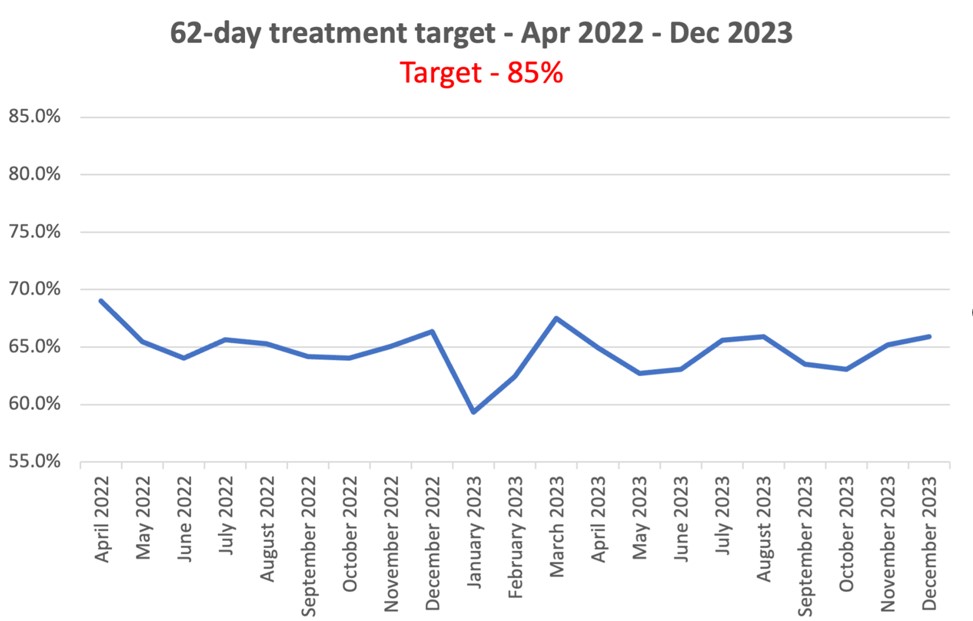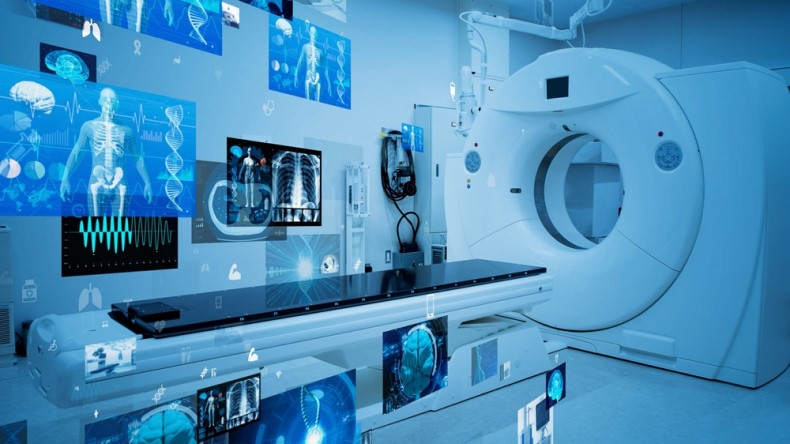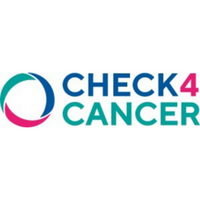3 ways employers can help mitigate the risks of a late cancer diagnosis for employees
It became clear by 2021 that Covid-19 lockdown restrictions had led to a major fall in the number of patients being diagnosed with cancer as a result of reduced access to diagnostic clinics and screening programmes.
Published data from the South-East London Cancer Alliance in 2021 reported a 4% increase in advanced stage presentation (Stages 3 & 4) due to successive lockdowns with the greatest changes in lung (6%), bowel (5%) and prostate cancer (4%).
In the UK, waiting times have remained lengthy for cancer diagnosis and treatment since the end of lockdown, with 34% of patients waiting longer than two months to start cancer treatment in December 2023 (Figure 1).
Waiting times for cancer diagnosis have come under increasing pressure from an increasing population, an ageing population and an increasingly unhealthy population.
With fewer workers, scanners and resources per head of population compared with comparable countries, patients in the UK will continue to experience delays in diagnosis with a resultant shift to later-stage diagnosis.
Figure 1 Cancer treatment waiting times December 2023 (NHS England)

The impact of later-stage diagnosis
A shift to later-stage cancer diagnosis means that in general, patients will require more extensive treatment, experience a longer time away from work and/or family and have reduced chance of survival.
What has not been known until now is the scale of this shift to later cancer stages as a result of lockdown restrictions but recently published data suggests it is much greater than anticipated from the early post-lockdown reports (4%-6%).
The scale of the problem
Data published in JAMA Network Open from Switzerland and Hungary confirms that there was a 17% shift to later stage melanoma diagnosis because of lockdown.
This contributed to an estimated 111,000 lost years of life across Europe at an additional cost of £6.1bn and we are likely to see similar data for other cancers coming in the coming months and years.
Te shift to later stage diagnosis in the UK could be even higher than 17% due to having less resources than many European countries.
So, what can employers do to mitigate the risks of a late cancer diagnosis for employees?
1. Cancer prevention
Many of the risk factors for common cancers are widely known, but how many people know that obesity and alcohol are risk factors for both bowel and breast cancer or, that more than 50% of bowel cancer can be prevented?
Greater education is required to communicate these risk factors. We need to adopt ways to assess cancer risk in the workforce and we need to provide access to support structures that promote behavioural change to lower individual risk.
2. Screening
Cancer screening helps to spot cancer at an earlier stage where there are no symptoms. Earlier detection means less intensive treatment and outcomes are greatly improved. This also has a positive effect on absenteeism and presenteeism rates.
Cancer screening can be made available to employees either as a flexible benefit, with payments spread over several months, or as a company-funded programme.
Corporate cancer screening has significantly increased since the end of lockdowns as companies step in to look after workers.
3 Diagnosis
Private cancer diagnostic services have traditionally been limited to employees with private medical insurance (PMI) but access to these services could be extended to those employees without PMI coverage via a trust or additional funding.
Summary
The delays to cancer diagnosis and treatment in the UK are likely to persist for some time as there seems no government appetite to provide the investment to increase the resources needed.
In contrast, check4cancer has the tools to help companies develop an early cancer detection strategy that works for them and their employees.
Supplied by REBA Associate Member, Check4Cancer
Check4Cancer offers corporate health screening for different types of cancer.








